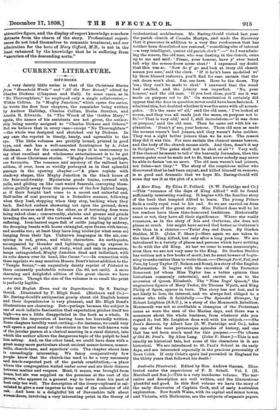A Hero King. By Eliza F. Pollard. (S. W. Partridge
and Co.) —This "romance of the days of King Alfred" will be found sufficiently interesting reading. It begins with the familiar story of the book that tempted Alfred to learn. The young Prince finds a really royal road to his end. So we are carried on from scene to scene of the great story. Miss Pollard does well to let her readers have these time-honoured traditions. Historically exact or not, they have all their significance. Where she really romances, as in the story of Iris and Guthrum, she does not please so much. Iris might have served God better as Guthrum's wife than in a cloister.—'Twizt Day and Dawn. By Gordon Stables, M.D. (John F. Shaw.)—Hero again we are taken to the time of King Alfred, but only after a long preface. We are introduced to a variety of places and persons which have nothing to do with the old King. At last we come to some manuscripts ; even then we are not very near to the King. Dr. Gordon Stables has written not a few books of merit, but he must beware of begin- ning to make rather than to write them.—Through Peril, Toil, and Pain, by Lucy Taylor (T. Nelson and Sons), is a story of the English Reformation. It begins with the execution of the Protector Somerset (of whom Miss Taylor has a better opinion than historians commonly entertain), and carries us on to the accession of Queen Elizabeth. The "Nine Days' Queen," the ungracious figures of Mary Tudor, Sir Thomas Wyatt, and King Philip of Spain, appear in turn. The story has not lost, and is not likely to lose, its interest, and we always feel obliged to a writer who tells it faithfully.—The Splendid Stranger, by Robert Leighton (S.S.U.), is a story of the Monmouth Rebellion. Monmouth was not so creditable a champion of the Protestant cause as were the men of the Marian days, and there was a meanness about the whole business, from whatever side you regard it; but Mr. Leighton does well with his subject.—The Inca's _Ransom, by Albert Lee (S. W. Partridge and Co.), takes up one of the most picturesque episodes of history, and one that has not been much used for this purpese.—The Chums of Old St. Paul's. By Alice Lang. (John F. Shaw.)—This is not exactly an historical tale, but some of the characters in it are historical. We are introduced to St. Paul's School in its early days, and are interested especially in the gracious personality of Dean Colet. If only Colet's spirit had prevailed in England for the thirty years that followed his death










































 Previous page
Previous page